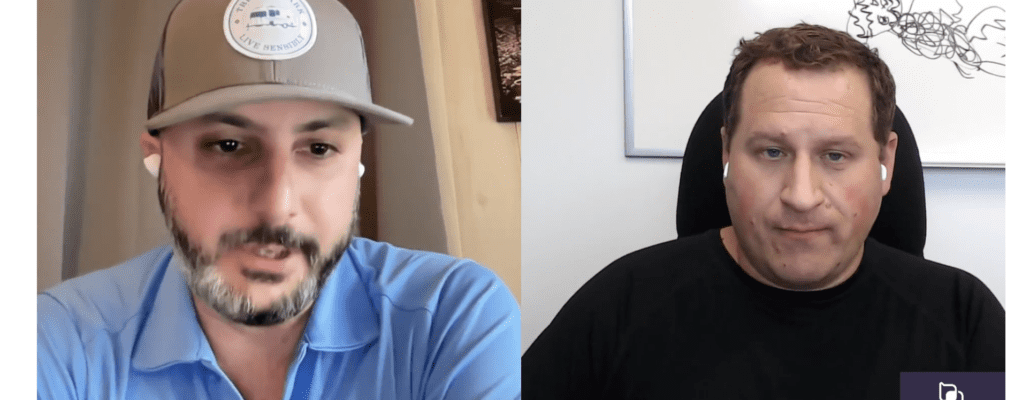TLDR: Addiction Help Podcast: Episode 2 Recap

Welcome back to TLDR, where we summarize the highlights of each episode of the Addiction Help Podcast. Today, we’re diving into Episode Two, which focuses on addiction, mental health, and recovery, with a particular emphasis on Alcohol Awareness Month. Host Dan Hauser is joined by guest Chris Carberg, founder and chief executive addict of addictionhelp.com.
What happened on Episode 2 of the Addiction Help Podcast?
Dan Hauser kicks off the episode by expressing gratitude to those who tuned into the pilot episode, including listeners who reached out to share the impact the podcast had on them. Unfortunately, co-host Jessica Miller is absent due to a migraine (or so she claims…)but the show goes on with guest Chris Carberg.
Chris enjoyed the first episode, featuring discussions between Dan and Jess, and recalls listening to it while driving. He emphasizes the importance of discussing addiction-related topics in the news and using them to spark deeper conversations.
The overall mission of addictionhelp.com and its network of shows is to meet people where they are—whether they’re battling addiction, in addiction recovery, or loving someone affected by addiction. Dan and Chris discuss the importance of humanizing addiction and destigmatizing the topic, reminding people that it’s okay to seek help.
Chris talks about the significance of Narcan as a “pause button” for addiction, allowing recovery to be possible. He also acknowledges the challenges faced by loved ones of individuals with addiction and the importance of compassion.
Alcohol Awareness Month – Who? What? Why?
April is Alcohol Awareness Month, and the hosts take this opportunity to address alcohol use disorder and abuse. They emphasize that alcohol is often perceived as a normal part of social life, heavily promoted in sports and media, and easily accessible to those over 21.
Dan and Chris discuss the negative effects of alcohol, including its potential to ruin relationships and create erratic behavior. They praise the availability of ride-sharing apps to reduce drunk driving and the rise of sober bars and non-alcoholic drinks as alternatives for those seeking sobriety.
Using the story of the Titanic as a metaphor, Chris suggests that sometimes people need to deal with problems head-on rather than avoiding them. Avoidance may make things worse. (Note, Chris is a keeper of a great deal of needless knowledge)
Celebrating Sobriety – Kyle Draper
The hosts transition to discussing the Sacramento Kings’ NBA playoff success and the story of Kyle Draper, the local television play-by-play announcer for the Kings, who celebrated six years of sobriety. Draper described himself as a “functioning alcoholic,” and his career took off after he stopped drinking.
The hosts delve into the concept of being a “high-functioning alcoholic” and how non-alcoholic options and mocktails can help people feel at ease in social situations. They highlight the increasing popularity of the “sober curious” movement.
The episode concludes with a reminder that help is available for those struggling with addiction or mental health issues, and the hosts provide contact information for the Substance Abuse and Mental Health Services Administration (SAMHSA).
Want the TLDR Full List of Stuff that Happened?
- Dan Hauser introduces episode two of the Addiction Help Podcast, which discusses addiction, mental health, and recovery.
- Chris Carberg, founder and chief executive addict of addiction help.com, joins Dan as a guest on the episode.
- Chris mentions that he enjoyed the first episode of the podcast, which featured discussions between Dan and Jess.
- Jess, who was supposed to co-host the episode, is absent due to a migraine.
- Dan expresses gratitude to those who listened to the pilot episode and provided feedback.
- Dan notes that some listeners he didn’t know personally reached out to share the impact the podcast had on them.
- Chris recalls his experience listening to the first episode while driving, and how he was disappointed when the feed momentarily cut off.
- Chris emphasizes the importance of discussing addiction-related topics in the news and using them as a starting point for deeper conversations.
- The goal of addiction help.com and its network of shows is to meet people where they are and to address issues relevant to those battling addiction, those in recovery, and those who love
- someone affected by addiction.
- Dan discusses the importance of humanizing addiction and tying it to real-world events to destigmatize the topic and remind people that it’s okay to not be okay and seek help for their
- problems.
- Chris talks about the importance of Narcan as a “pause button” for people battling addiction, highlighting that recovery is impossible if someone dies from an overdose.
- Chris acknowledges the challenges faced by loved ones of people with addiction, including disappointment and relapse, and emphasizes the importance of compassion and taking chances
- on people.
- Chris reflects on his own journey to sobriety and the continued personal growth he has experienced since getting sober in 2005.
- Dan encourages listeners to subscribe to the Addiction Help Podcast and teases the development of the entire Addiction Help podcast network.
- Dan introduces the main topic of the episode: April is Alcohol Awareness Month, a time to spread awareness of the dangers of alcohol.
- Chris reflects on the meaning of Alcohol Awareness Month and the importance of recognizing and addressing alcohol use disorder and alcohol abuse.
- Chris emphasizes the need to identify the signs of problematic alcohol use and educate people on the dangers and consequences of alcohol addiction.
- April is Alcohol Awareness Month, which aims to raise awareness about the dangers of alcohol abuse and addiction.
- The hosts emphasize that the issues related to alcohol use and abuse do not disappear after the month ends.
- Alcohol is often perceived as a normal part of social life, and it is heavily promoted in sports, media, and various events.
- Alcohol is considered a depressant and can have serious negative effects on individuals and families.
- Alcohol addiction has the potential to ruin relationships and create erratic behavior.
- Unlike illicit substances, alcohol is easily accessible and can be legally obtained by anyone over the age of 21.
- The hosts discuss the availability of ride-sharing apps (e.g., Uber and Lyft) as options for reducing drunk driving.
- Despite increased awareness about the dangers of drunk driving, it remains a significant issue, with someone killed in a drunk driving crash every 45 minutes.
- The hosts acknowledge the rise of sober bars and non-alcoholic drinks, which provide alternatives for individuals seeking sobriety.
- They also discuss the importance of educating children and young adults about the risks of alcohol use.
- The hosts suggest that awareness is key in preventing alcohol-related harm, and that individuals should consider the long-term consequences of their actions (i.e., “play the tape all the
- way through”).
- Host Chris reflects on the story of the Titanic and how it could have survived the collision if it had rammed the iceberg head-on instead of trying to turn away.
- He suggests that sometimes people need to deal with problems head-on rather than avoiding them, as avoidance may make things worse.
- Host Dan transitions to discussing the Sacramento Kings’ success in making the NBA playoffs for the first time in over a decade.
- The hosts mention Kyle Draper, the local television play-by-play announcer for the Sacramento Kings, who celebrated six years of sobriety after struggling with alcohol addiction.
- Draper shared that he never realized he was an alcoholic until he stopped drinking, at which point he noticed how much alcohol had impacted his life, friendships, and social anxiety.
- Draper described himself as a “functioning alcoholic,” meaning he was still dependable, working, and doing what was expected of him.
- When Draper stopped drinking, his career took off and he was offered a job with the Oklahoma City Thunder, although he ultimately did not take the job.
- The hosts discuss the idea of being a “high-functioning alcoholic” and the impact it can have on a person’s life.
- They discuss how sometimes people need a “prop” (such as a drink) to feel at ease in social situations.
- Draper found comfort in ordering non-alcoholic beers and mocktails when he was in social settings, helping him overcome anxiety and feeling like everyone was watching him.
- The hosts note the increasing popularity of non-alcoholic options and mocktails, as well as the “sober curious” movement.
- They emphasize that more bars and restaurants now offer non-alcoholic options on their menus, making it easier for people who choose not to drink to feel comfortable in social settings.
- The episode ends with a reminder that help is available for those struggling with addiction or mental health issues, and they provide contact information for the Substance Abuse and Mental Health Services Administration (SAMHSA).
Tidbits
Some other stuff happened too:
- Jess had a migraine.
- Chris ate a hotdog.
- Jack & Rose could have survived the Titanic.
- Chris says hi to his mom
- Black coffee makes you look tough.
- Chris’s wife Jenna is his “taste tester”
- Poisoning Chris would be challenging.
- Feel better, Jess!
That’s it for the TLDR recap of Episode Two of the Addiction Help Podcast.
Like & Subscribe:
Don’t forget to subscribe to the podcast and join us next time as we continue the conversation on addiction, mental health, and recovery.
Spotify
Podcast Republic
Apple Podcasts
Google Podcasts
Amazon Music
YouTube
Find a Treatment Center Near You
- Treatment Center Locator
- Help You Can Trust
- Unbiased Support



